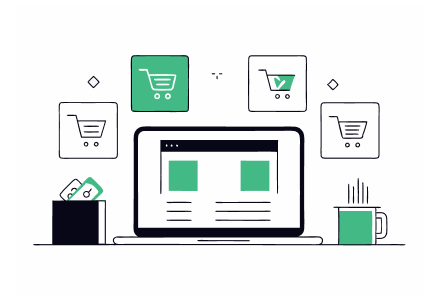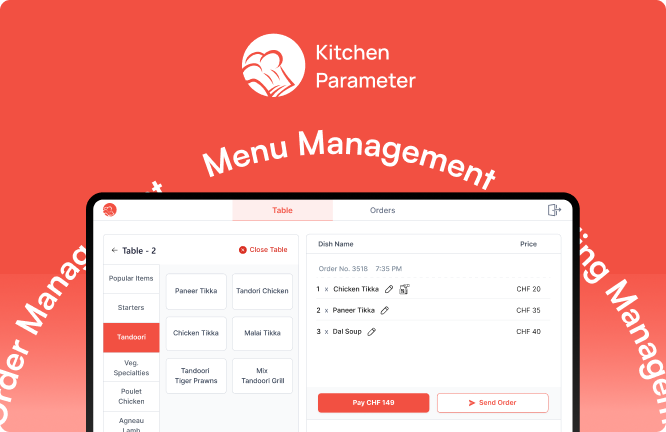In today’s digital world, having a strong online presence is essential for businesses to thrive. eCommerce software development plays a crucial role in building scalable, secure, and user-friendly online stores that cater to the ever-growing demand for online shopping. Whether you’re a startup or an established enterprise, choosing the right eCommerce software solution development approach can determine the success of your online business.
Explore the key steps, modern technologies, and proven best practices shaping e-Commerce software development in 2025.
Whether you’re just starting out or have been in company for a while, creating a SaaS solution that meets your needs requires an in-depth knowledge of the ins and outs of SaaS development.
Why eCommerce Software Development is Essential for your Business
In the digital age, eCommerce software development is a must for companies that seek to grow their online business and boost sales. With the advent of online shopping, it is no longer an option but a necessity to have a strong eCommerce platform in order to remain competitive.
A well-crafted eCommerce software solution provides several advantages, such as global access, enabling companies to sell products and services outside geographical boundaries. It improves customer experience through functionalities such as easy navigation, custom suggestions, and hassle-free checkout. Companies can also use data-driven insights to monitor customer activity, enhance marketing strategies, and enhance conversions.
Security is another key consideration—incorporating secure payment gateways and practicing best security practices in cybersecurity safeguards businesses as well as customers against fraud. Scalability also matters, since a customized eCommerce software development solution helps the platform scale with the business and manage growing traffic and product listings with ease.
Furthermore, the combination of AI Development, automation, and high-level analytics enhances eCommerce platforms by making them more intelligent, facilitating smooth operations, and improving user interaction. For startups or corporations, investing in e Commerce software development is the core to fuel revenue, enhance efficiency, and maintain leadership in the competitive online environment.
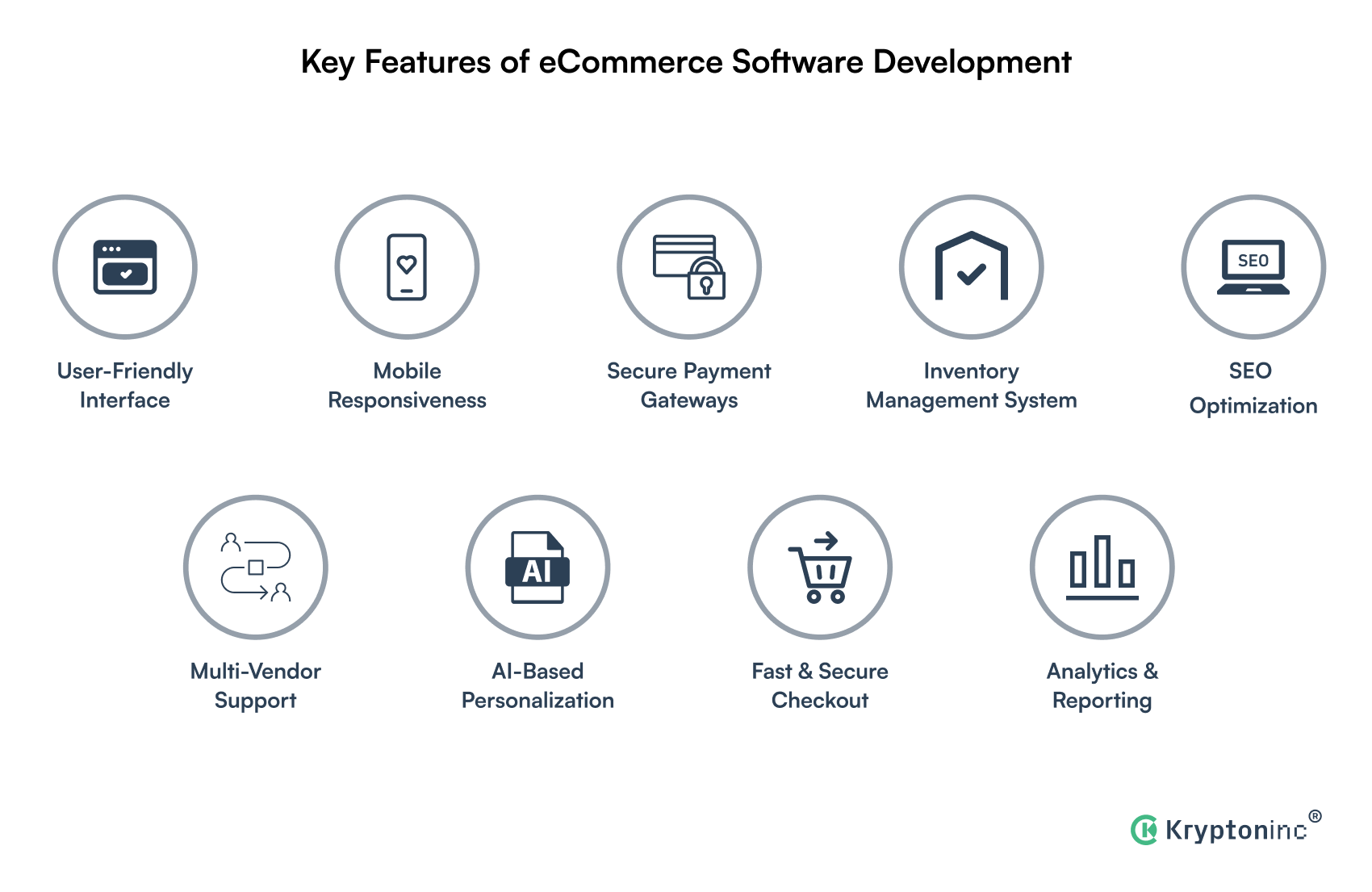
Key Features of e-Commerce Software Development
A well-developed eCommerce software solution development must include essential features that enhance user experience, improve security, and drive sales. Below are the key features that make an eCommerce platform successful:
1. User-Friendly Interface
A clean, intuitive, and easy-to-navigate interface ensures that users can browse products effortlessly, leading to higher conversion rates.
2. Mobile Responsiveness
With a majority of users shopping via mobile devices, it’s essential to not only optimize your eCommerce platform for smartphones and tablets but also consider mobile app development for a seamless, on-the-go shopping experience.
3. Secure Payment Gateways
Integrating trusted payment options like PayPal, Stripe, or Razorpay ensures safe and seamless transactions, building customer trust.
4. Inventory Management System
Real-time inventory tracking helps businesses manage stock levels efficiently, preventing overselling or stockouts.
5. SEO Optimization
SEO-friendly features like optimized URLs, meta descriptions, and structured data improve search engine rankings and drive organic traffic.
6. Multi-Vendor Support
For eCommerce marketplaces, allowing multiple vendors to sell products ensures variety and enhances customer choice.
7. AI-Based Personalization
AI-powered recommendations and chatbots enhance user engagement by offering personalized shopping experiences.
8. Fast & Secure Checkout
A streamlined checkout process with multiple payment options reduces cart abandonment and improves conversions.
9. Analytics & Reporting
Built-in analytics tools provide insights into customer behavior, helping businesses optimize marketing strategies.
Investing in eCommerce software development with these features ensures a scalable, secure, and user-friendly platform that maximizes revenue potential.
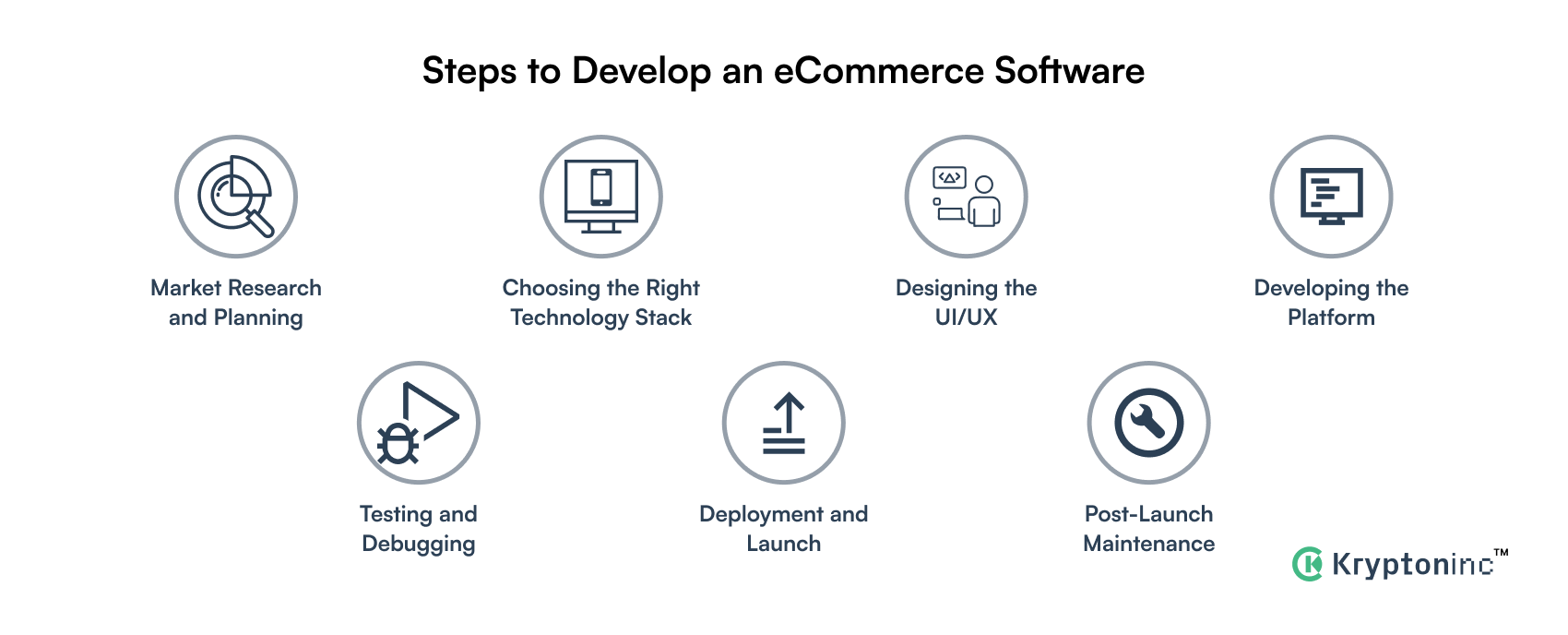
Essential Components of a High-Converting eCommerce Software
The average eCommerce conversion rate globally stands at around 2.58%, while industry giants like Amazon achieve an impressive 13% conversion rate. So, what sets leading eCommerce platforms apart from the rest?
1. Intuitive Navigation
A well-structured navigation system ensures customers can find products quickly, reducing friction and enhancing the shopping experience.
2. High-Resolution Product Images
Clear, professional, and zoomable product images provide customers with a detailed visual representation, increasing purchase confidence.
3. Comprehensive Product Descriptions
Well-written, informative descriptions with features, specifications, and benefits help shoppers make informed decisions.
4. Customer Reviews & Ratings
Displaying authentic user reviews builds trust, boosts credibility, and influences potential buyers.
5. Secure & Seamless Checkout
A hassle-free checkout process with multiple payment options, SSL encryption, and guest checkout functionality reduces cart abandonment.
6. Advanced Search Functionality
An optimized search bar with filters, auto-suggestions, and AI-driven recommendations ensures customers find products effortlessly.
7. Mobile-Optimized Design
A responsive and mobile-friendly eCommerce platform ensures seamless shopping experiences across all devices.
By incorporating these must-have elements, businesses can create a highly functional and conversion-optimized eCommerce software that drives sales and customer satisfaction.
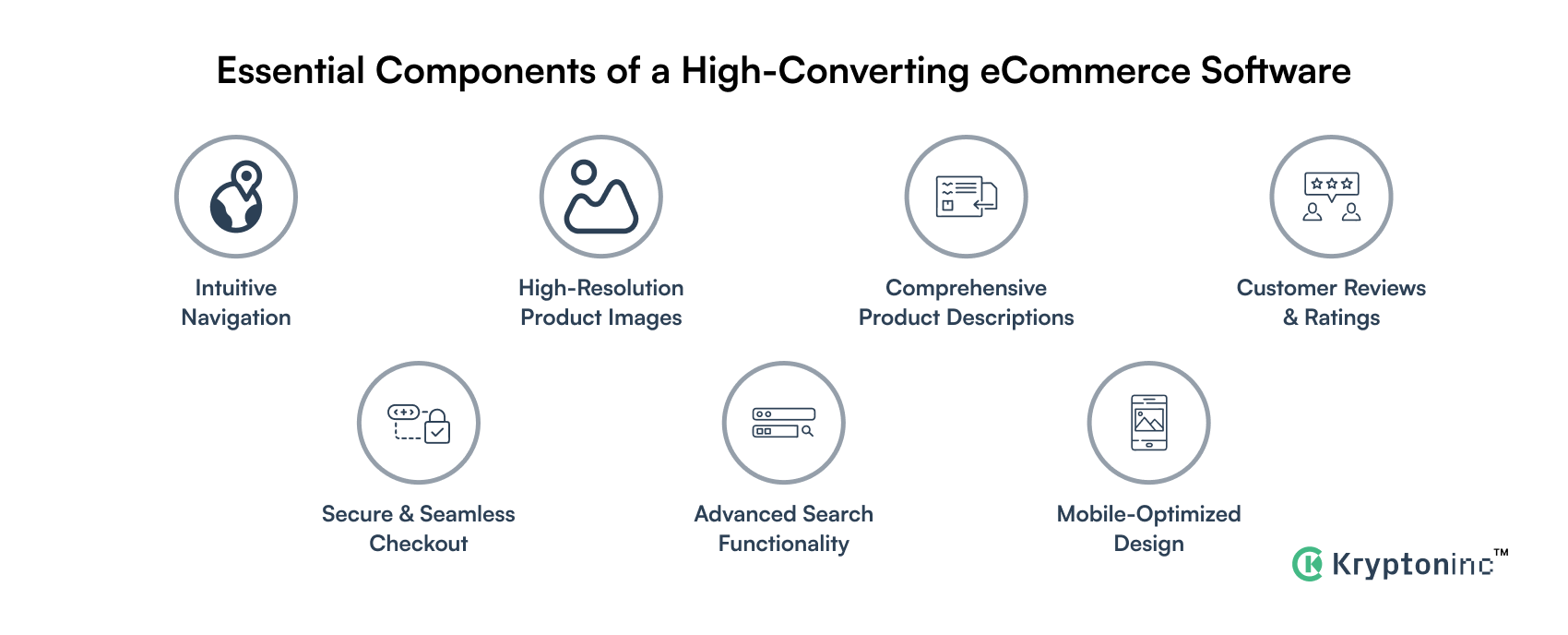
Ideal Steps to Develop an eCommerce Software Solution
1. Market Research and Planning
Before diving into development, conduct thorough market research to understand:
- Target audience and buying behavior
- Competitor strategies
- Market trends
2. Choosing the Right Technology Stack
Selecting the right technology stack is crucial for building a robust eCommerce software solution. Popular choices include:
- Frontend: React.js, Angular, Vue.js
- Backend: Node.js, Django, Ruby on Rails
- Database: MySQL, PostgreSQL, MongoDB
- Payment Gateways: Stripe, PayPal, Razorpay
3. Designing the UI/UX
A well-designed user interface improves customer engagement. Prioritize:
- Simple navigation
- Clear call-to-action buttons
- Visually appealing product pages
4. Developing the Platform
Based on your requirements, you can opt for:
- Custom eCommerce software development – Tailored solutions with complete control.
- CMS-Based Development – Using platforms like Shopify, Magento, WooCommerce.
5. Testing and Debugging
Ensure thorough testing before launch to eliminate bugs and enhance performance. Types of testing include:
- Functional Testing
- Performance Testing
- Security Testing
6. Deployment and Launch
Deploy the platform on a secure server, ensuring optimized speed and performance. Popular hosting services include AWS, Google Cloud, and Azure.
7. Post-Launch Maintenance
Regular updates and maintenance ensure security, performance, and feature enhancements. Monitor:
- Website speed
- User feedback
- Conversion rates
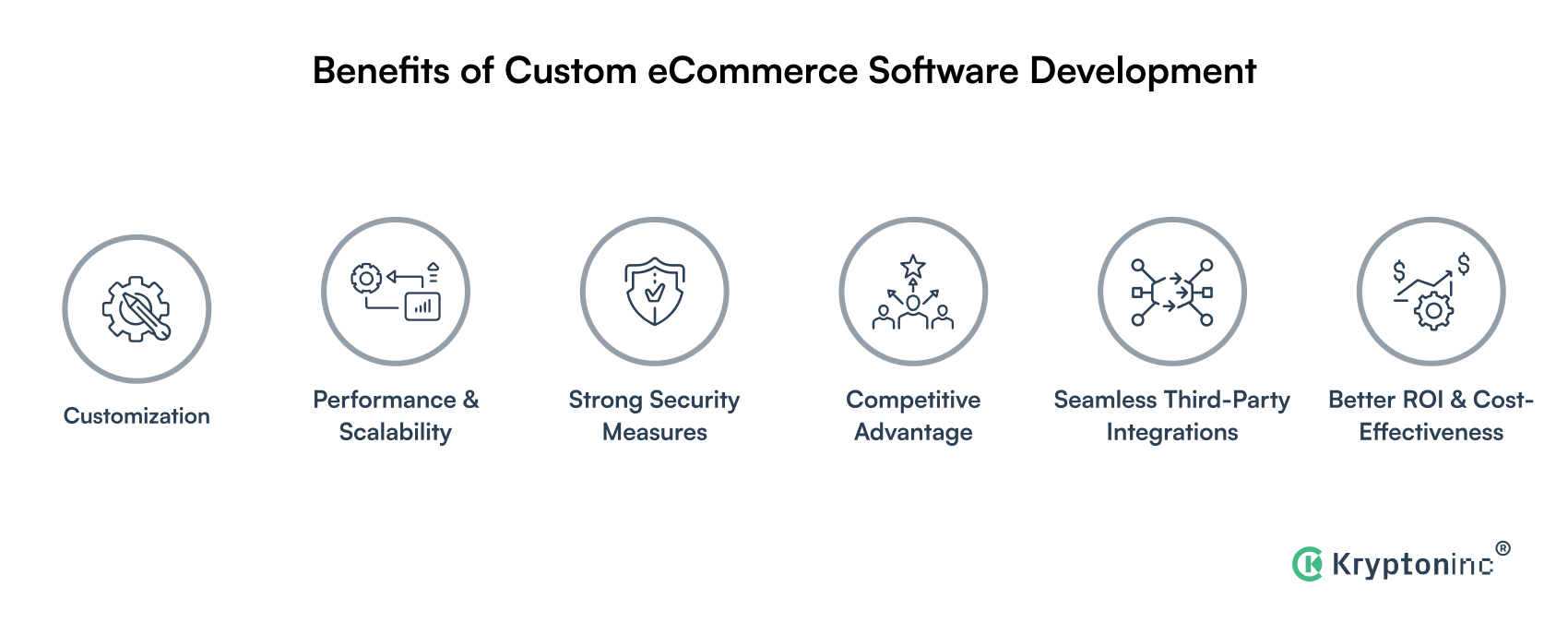
Benefits of Custom eCommerce Software Development
Custom eCommerce software development investment gives companies more flexibility, scalability, and control over their web stores. Custom eCommerce platforms are not fixed like off-the-shelf software; they can be developed to satisfy specific business requirements, giving companies a competitive advantage.
1. Customization
Custom eCommerce software development enables companies to create a one-of-a-kind platform with features that are created according to their specific needs, providing a smooth user experience and brand-specific design.
2. Performance & Scalability
In contrast to off-the-shelf solutions that are likely to be slowed down with increasing traffic, a custom eCommerce platform is geared towards high performance and scalability for seamless operations during busy sales seasons.
3. Strong Security Measures
Security ranks high among concerns for eCommerce sites. A custom solution enables the incorporation of powerful security measures such as SSL encryption, secure payment processing, and data protection methodologies to ward off cyber attacks.
4. Competitive Advantage
Personalized features like AI-driven recommendations, customized customer experiences, and streamlined third-party integrations make organizations unique in an over-saturated marketplace.
5. Seamless Third-Party Integrations
Custom offerings integrate more seamlessly with CRM, ERP, payment gateways, and marketing tools, enabling smooth flow between all business processes.
6. Better ROI & Cost-Effectiveness
While the upfront costs will be greater, custom eCommerce software development results in long-term cost savings through the avoidance of duplicate subscription fees and complete control over platform upgrades.
Through the selection of custom e-Commerce software development, businesses can create a high-performing, secure, and future-proof online store that meets their own specific objective
Moreover, SaaS platforms often offer features that are difficult or costly to implement in traditional on-premise software. Some of these are cloud storage, automatic updates, and the ability to work with other cloud-based apps without any problems.
How to Select the Best eCommerce Platform for Your Business
After identifying the key elements required for your custom eCommerce software, the next crucial step is selecting the right eCommerce platform.
With hundreds of eCommerce solutions available in the market—including Shopify, WooCommerce, Magento, and BigCommerce—choosing the right one can be overwhelming. Each platform has its own advantages and limitations, and what works for one business may not necessarily work for another.
Key Factors to Consider:
- Business Needs & Features – Identify whether you need advanced customization, multi-vendor support, or AI-driven personalization.
- Budget & Pricing – Compare platform pricing, including setup fees, transaction costs, and maintenance expenses.
- Scalability – Choose a platform that can grow with your business, handling increased traffic and expanding product catalogs.
- Customization & Flexibility – Open-source platforms like Magento offer greater customization, while hosted solutions like Shopify provide ease of use.
- SEO & Marketing Tools – Look for platforms with built-in SEO features, analytics, and marketing automation support.
- Security & Compliance – Ensure the platform meets industry security standards, including PCI-DSS compliance for payment processing.
To make an informed decision, consulting eCommerce software development experts is recommended. They can analyze your specific requirements and guide you toward the best-suited eCommerce platform for your business goals.
If you’re seeking to take your business to the next level with innovative IT solutions, partnering with an experienced SaaS development company can help turn your vision into reality. To learn more about the ways in which professional development services can improve your business.
Explore our IT solutions services and discover how we can assist in the realization of your ideas.
Choosing the Right Approach for e Commerce Software Development
If you’re considering eCommerce software development services, you have three primary options: hiring an in-house team, working with freelancers, or partnering with an eCommerce development agency. Each option has its pros and cons, making it essential to choose based on your budget, project scope, and long-term needs.
Freelancers
- Pros: Access to a global talent pool, flexible hiring, and cost-effective solutions.
- Cons: Potential communication challenges, reliability issues, and inconsistent quality.
- Best Used For: Small to medium projects, short-term development tasks, and specific feature enhancements.
In-House Development Team
- Pros: Dedicated full-time resources and a deep understanding of company goals.
- Cons: High recruitment and operational costs, limited expertise in diverse technologies.
- Best Used For: Medium to large projects, long-term development needs, and businesses requiring full control.
eCommerce Development Agency
- Pros: Specialized expertise, structured development processes, and comprehensive end-to-end support.
- Cons: Requires effort to find the right agency and may involve a higher initial investment.
- Best Used For: Small to enterprise-level businesses, complex and scalable projects, and businesses seeking long-term maintenance and support.
While freelancers and in-house teams offer flexibility and direct control, eCommerce development agencies are the preferred choice for businesses aiming for scalability, quality, and long-term success.
Cost of eCommerce Software Solution Development
The cost of eCommerce software development depends on various factors:
- Complexity of Features – Advanced functionalities like AI recommendations increase development costs.
- Technology Stack – The choice of programming languages and frameworks affects pricing.
- Development Team – Hiring experienced developers costs more but ensures quality.
- Third-Party Integrations – Payment gateways, shipping APIs, and other integrations impact cost.
Need Expert eCommerce Software Development in USA?
Looking for professional e-Commerce software development solutions in USA? Contact us today to build a scalable and secure online store tailored to your business needs!
Conclusion
eCommerce software development is evolving rapidly, offering businesses new opportunities to scale and innovate. Whether you’re developing a custom eCommerce platform or using a CMS-based solution, prioritizing user experience, security, and scalability is essential.
By implementing the right technologies and best practices, businesses can create high-performing eCommerce platforms that drive sales and customer engagement in 2025 and beyond.
FAQs
What is eCommerce software development?
eCommerce software development is the process of building custom platforms or applications that enable businesses to sell products or services online. It involves developing both the frontend (user interface) and backend (server, database, admin panel) to manage everything from product listings and payments to inventory, shipping, and customer engagement. It can be custom-built or based on platforms like Shopify, Magento, or WooCommerce, depending on business needs.
Which software is best for eCommerce website development?
Shopify is great for beginners, WooCommerce for flexibility, and Magento or custom development for large-scale businesses needing advanced features.
Is Wix or Shopify better for e-commerce?
Both platforms are good—but they serve different needs:
Shopify is generally better for serious eCommerce businesses. It offers powerful features, scalability, better payment integrations, and robust inventory management. It’s ideal for businesses looking to grow quickly and manage large volumes of orders.
Wix is better suited for small shops or those just starting out. It’s easier to use, more flexible for content websites, and great for combining blogs or portfolios with a small store.
Verdict:
Choose Shopify if eCommerce is your primary focus.
Choose Wix if you want an easy, budget-friendly website with light eCommerce functionality.
What are the must-have features in an eCommerce website?
Product catalog, secure payments, mobile responsiveness, search, cart, checkout, and admin dashboard.
Should I choose custom development or a platform like Shopify?
Choose Shopify for speed and ease, custom development for flexibility and advanced features.
Can I integrate payment gateways in custom-built stores?
Yes, custom stores can integrate gateways like Stripe, PayPal, Razorpay, or others as needed.
